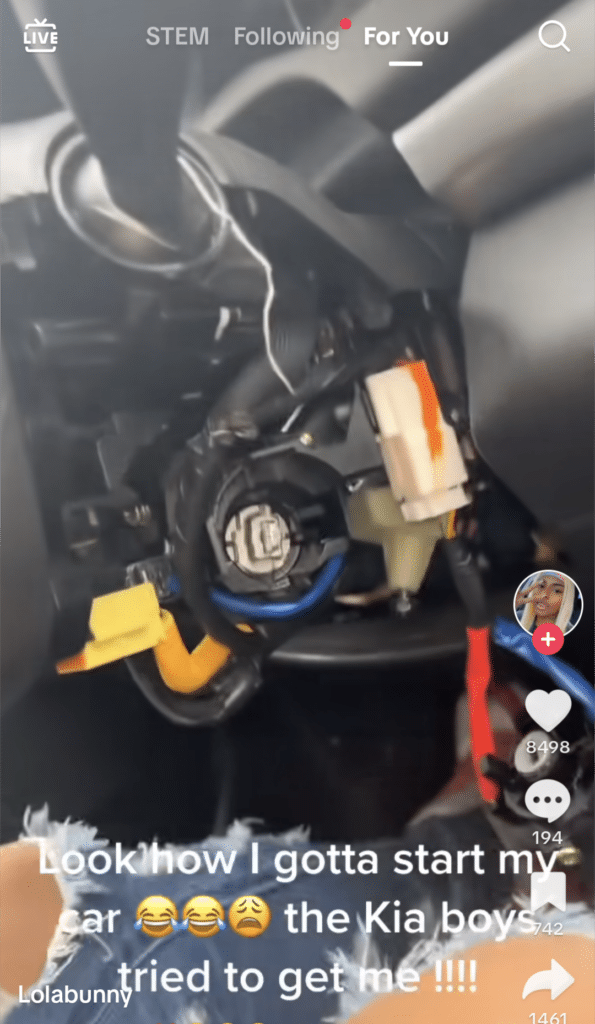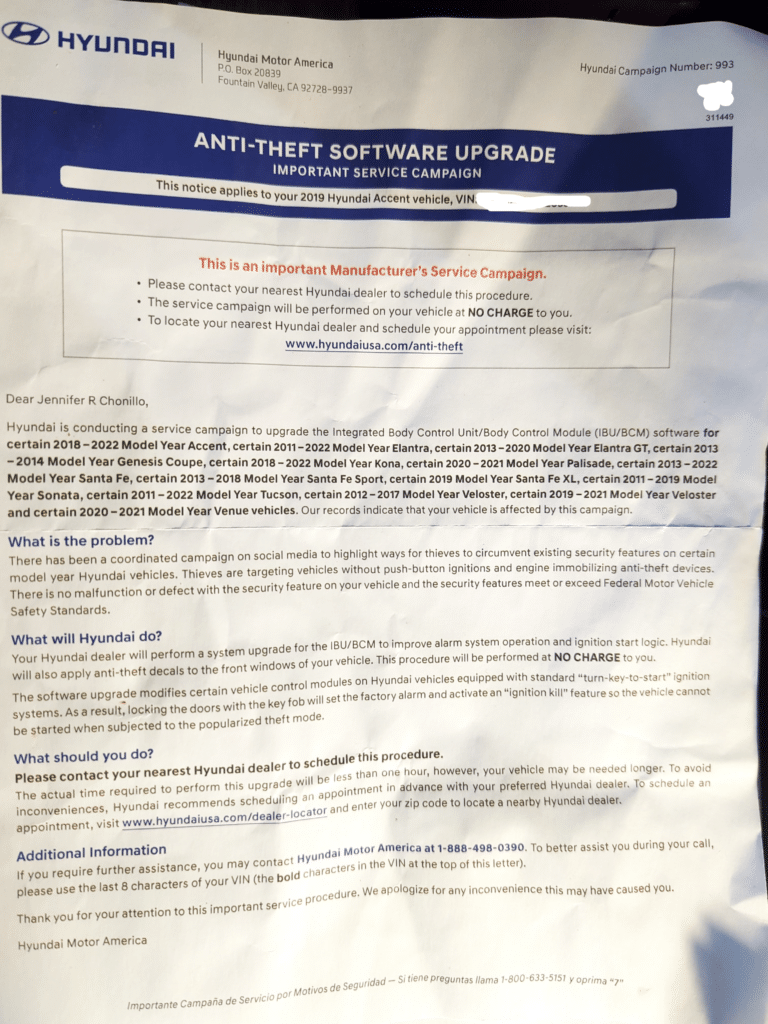Affiliate Disclosure: Automoblog and its partners may earn a commission when you use the services and tools outlined here for extended warranties, car shipping companies, and auto loan comparisons. These commissions come to us at no additional cost to you. See our Privacy Policy to learn more.
What started as a viral trend on the internet has resulted in real-world challenges for two of the world’s most popular automotive brands. In response to a massive spike in thefts of their vehicles, the automakers Kia and Hyundai announced a recall in February in an attempt to fix the security issue that has made their vehicles vulnerable. The recall comes after months of attention online and growing pressure from local and state governments.
Theft of Kia and Hyundai vehicles started to spike in the summer of 2022 after videos from a group calling themselves the Kia Boyz went viral on social media app TikTok in May. These videos picked up attention after YouTube creator Tommy G posted a video on May 31 in which he interviewed some of the Kia Boyz about their methods, generating more than 2.6 million views in one month.
The videos demonstrated how the ignition switch for the vehicles could be easily overridden with basic tools and a USB cable. This spawned what came to be known as the “Kia Challenge” that, like other social media challenges, encouraged others to replicate what they saw on the videos.

Stealing a car through the “TikTok method” was possible because, rolling off the assembly line, many Kia and Hyundai models lack an anti-theft feature known as an immobilizer. This “kill switch” prevents the engine from starting up if the chip in the ignition system doesn’t connect with a matching chip in the key.
Chip keys were introduced in the 1990s and have since become relatively standard. According to the Insurance Institute for Highway Safety (IIHS), immobilizers are standard equipment on 96% of 2015 model year vehicles made by manufacturers other than Kia and Hyundai. However, the anti-theft technology comes standard on only 26% of Kia and Hyundai models in the same year.
IIHS insurance claim data show that since the “Kia Challenge” became popular, theft of Hyundai and Kia cars has increased dramatically – although not uniformly across all states. In all states other than Colorado and Wisconsin, theft claim frequencies for Kia and Hyundai vehicles rose an average of 35% between 2019 and 2021. However, claim frequencies rose 1,477% in Colorado over the same period, and 3,246% in Wisconsin.
Theft Has Created a Number of Problems For Kia and Hyundai
The popularity of the “Kia Challenge” wasn’t limited to TikTok. Google search trend history shows that search interest for “Kia theft” was at a nine out of 100 the week before the Tommy G video was uploaded. By the week of August 14, 2022, search interest for the same term reached 100 out of 100.
That increase in search interest coincided with – and was perhaps encouraged by – a sharp uptick in news coverage around the issue. As search interest was growing rapidly, news organizations around the country began covering the issue. Local, regional, and national coverage brought the theft spree to national attention, aggravating the issue for Kia and Hyundai.
Hyundai and Kia owners filed a class action lawsuit in 2022 against the automakers over the cars’ vulnerabilities. The lawsuit, filed by Hagens Berman Sobol Shapiro LLP on behalf of Kia and Hyundai owners in the U.S., alleges that the manufacturers ignored Federal Motor Vehicle Safety Standards (FMVSS) code and failed to install immobilizers in an attempt to cut costs. It also points to several other design features that made the vehicles easier to steal.
“Defendants have knowingly sold millions of Class Vehicles that do not contain this vital safety component and have other design flaws that eschew FMVSS No. 114,” the official filing says, referring to Kia and Hyundai. “Defendants’ pursuit of profits over safety have put millions ofpeople at risk of loss, injury, and even death.”
Government Agencies Took Notice of the Trend, Too
As Hyundai and Kia theft climbed along with awareness of the trend, the story also caught the attention of local and state governments, and eventually the federal government. Authorities and agencies around the country responded in a variety of ways.
At the local level, some cities began providing free anti-theft devices to owners of vulnerable vehicles. Beginning in 2022, police issued free steering wheel locks in cities like Charlotte, North Carolina and Seattle, Washington, among many others. Eventually, Kia and Hyundai began sending steering wheel locks to local police and sheriff’s departments across the U.S.
Earlier this year, attorneys general from 22 different states wrote a joint letter to Kia and Hyundai. The letter, dated March 20, 2023, urged the automakers to voluntarily recall affected vehicles and fix the vulnerability. It cited traffic deaths resulting from thefts and the disproportionate use of law enforcement resources as two central reasons for the need for urgent action.
“Your companies’ decisions not to install anti-theft immobilizers as standard equipment on certain vehicles sold in the United States has caused ongoing consumer harm and undermined public safety in communities across the country,” said the letter in its closing statement. “It is well past time that you acknowledge your companies’ role and take swift and comprehensive action to remedy it.”
That letter was followed by a joint letter on April 20 to the National Highway Traffic Safety Administration (NHTSA) requesting regulatory action. In the latter, the attorneys general outline the specific vulnerabilities in Kia and Hyundai vehicles. They also point to property damage, injuries, and fatalities caused by drivers of the stolen vehicles along with information about how much the theft trend has consumed law enforcement resources.
Signed by 18 attorneys general from around the U.S., the letter also provides a suggested course of action to remedy the issue. It asks the NHTSA to “use its authority to institute a recall of unsafe Hyundai and Kia vehicles manufactured between 2011 and 2022 whose easily-bypassed ignition switches and lack of engine immobilizers make them particularly vulnerable to theft.”
Kia and Hyundai Have Issued a Massive Recall
These letters, however, came after the NHTSA announced in a press release that both Kia and Hyundai had made plans to address the ignition vulnerabilities on February 14, 2023. It highlighted several actions the company planned to take to make vehicles less susceptible to theft.
The press release stated that the companies would roll out free software updates that would require the ignition key to be inserted to turn the vehicles on and improve their alarm system logic. In addition, the release said that the automakers would also issue window stickers that clearly disclose the presence of anti-theft technology on the vehicles.
According to the February release, Kia and Hyundai would start rolling out the recall in a phased approach “later this month, with ensuing phases throughout the next several months.” The companies also released lists of the vehicles being recalled. But the Associated Press reported in May – three months after the NHTSA press release – that the updates had failed to curb thefts.
The ongoing prevalence of the thefts could be due the phased approach of the rollout – even by May, many Hyundai and Kia owners had yet to be contacted about the recall. Several vehicle owners who spoke to Automoblog on the matter in June said that they had only recently received notice of the recall.
Automoblog was able to retrieve a copy of the recall notice from one Hyundai owner, posted directly below.

The lack of progress on the issue could be part of what inspired the letters from attorneys general to the automakers and the NHTSA, despite an official recall already being underway.
Hyundai and Kia Settled the Theft Lawsuit
On May 18, Hagens Berman Shobol Shapiro LLC announced via a press release that it had reached a settlement agreement with Kia and Hyundai in the class action lawsuit. As part of the settlement, the automakers agreed to pay more than $200 million in benefits to eligible car owners.
The payout includes $145 million earmarked for compensation for out-of-pocket damages. Individual Hyundai and Kia owners are entitled to receive up to $6,125 for total losses and $3,375 in vehicle and personal property damage compensation. The latter figure also includes reimbursement for related costs, such as car rentals, alternative transportation costs, and insurance-related expenses.
Under the agreement, Kia and Hyundai will also provide software updates for eligible vehicles free of charge. Owners of vehicles that are not eligible for a software update can receive up to $300 towards new steering wheel locks, glass breakage alarms, or other anti-theft features.
“We believe this settlement offers comprehensive, welcome relief for the class that will serve as a lesson to automakers to not overlook such integral, basic safety features,” said Roland Tellis of Baron & Budd, another firm that participated in the lawsuit.
What Does the Theft Spree Mean for Kia and Hyundai’s Future?
Whether Kia and Hyundai’s decisions not to outfit many of their vehicles with immobilizers was an intentional move to reduce costs, as the class-action lawsuit alleged, or simply a massive oversight, the decision has been a costly one for the automakers. In addition to the $200 million payout, the companies also need to foot the bill for countless hours of labor needed to complete the recall. There is also the opportunity cost that comes with having service departments around the country occupied with the recall rollout, rather than working to generate revenue for the companies.
At the time of publication, any fallout from the theft spree and publicity around it doesn’t appear to have affected sales for either manufacturer. Kia – and to a lesser degree, Hyundai – have shown continued growth overall since June 2021, when the trend entered the news cycle. Sales for both manufacturers dipped at the beginning of 2022, but that drop coincided with a similar drop in auto sales overall.
However, it will be months or more before the lasting effects of the “Kia Challenge” on Kia and Hyundai’s brand reputations can be fully assessed. Both companies have steadily increased their market share in the U.S. over the first quarter of the 21st century. Whether or not the theft spree that started on social media changes that trajectory could hinge on how the companies handle their recalls – and what changes they make going forward.




